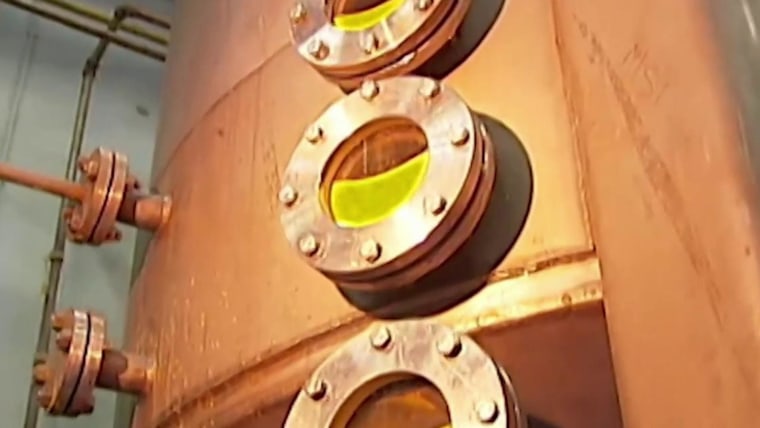[ad_1]
WASHINGTON — Iran has no plans to hold talks with the Biden administration and is waiting for the new U.S. president to take the first step to lift sanctions and return the U.S. to the 2015 multinational nuclear agreement, Tehran’s U.N. ambassador told NBC News on Monday.
In his first interview since President Joe Biden was sworn in last week, Amb. Majid Takht Ravanchi told NBC’s chief foreign correspondent Richard Engel that Iran has not spoken to the new administration yet.
“No, there has not been any conversation between Iran and the U.S. after Biden came into office,” Ravanchi said.
Asked if there were plans to open up a direct dialogue with Washington or indirect communication through an intermediary, perhaps via the Swiss government, Ravanchi said, “We are not planning to initiate anything.”
The Swiss foreign ministry handles any official U.S. communication with Iran, because Washington has no embassy in Tehran and no formal diplomatic relations with Iran.
Echoing similar statements from Iran’s foreign minister, Mohammad Javad Zarif, the Iranian diplomat said Tehran was not prepared to offer goodwill gestures or confidence-building steps until the U.S. returned to the nuclear agreement it left in 2018.
In the meantime, Iran was in no rush, Ravanchi said.
“It’s up to the U.S. to decide what course of action to take. We’re not in a hurry,” he said.
Iran’s economy has dramatically contracted under the weight of U.S. sanctions which were reimposed after ex-President Donald Trump withdrew the United States in 2018 from an international nuclear agreement between Iran and world powers. The deal, known as the Joint Comprehensive Plan of Action or JCPOA, introduced strict limits on Iran’s nuclear program in return for easing economic sanctions.
As a candidate, Biden said he would have the United States return to the agreement if Iran met its obligations under the deal.
Citing Biden’s statements, Ravanchi said Iran wanted to see the new president make good on his promises and if he did, Tehran would be ready to once again abide by the terms of the accord.
“The ball is in the U.S. court,” Ravanchi said.
“It is totally up to the new administration. So as soon as they implement their obligations, Iran has said on numerous occasions that Iran will return to the full implementation of its undertakings.”
Despite Iran’s contention that the first move is up to Washington, members of Biden’s national security team have suggested the new administration was not on the verge of a quick decision to rejoin the nuclear deal.
“We are a long way from there,” Antony Blinken, Biden’s pick for secretary of state, told the Senate Foreign Relations Committee on Jan. 19.
Blinken said the administration would first need to evaluate if Iran was complying with the nuclear agreement. Avril Haines, Biden’s choice as director of national intelligence, also indicated at her Senate confirmation hearing that there was no imminent decision coming on returning to the agreement.
Since Trump pulled the U.S. out of the agreement, Iran has gradually breached the deal’s restrictions on uranium enrichment, shrinking the time it would take for the regime to secure nuclear weapons. Nuclear experts say that Iran’s “breakout time” to secure enough weapons-grade material for an atomic bomb has dropped from 12 months when the agreement came into force to about three to four months.
Ravanchi said Iran does not seek a nuclear arsenal and simply wants to build a nuclear energy program for civilian purposes.
Ravanchi said it would be “absurd” for Iran to take conciliatory steps now when it was the U.S. that violated the 2015 agreement by withdrawing.
“Words are not enough. We need to see action on the part of the United States,” he said.
Reviving the deal also could be complicated by the imprisonment of another American in Iran. Only weeks after Biden was elected in November, and three days after an Iranian nuclear scientist was assassinated, Iranian authorities convicted and imprisoned an Iranian-American businessman, Emad Shargi, on spying charges, NBC News previously reported.
Ravanchi did not comment specifically on the case but said Iran would be open to an exchange of Iranian nationals detained in the United States in return for American citizens imprisoned in Iran.
“We are ready to engage on a comprehensive exchange of all prisoners or detainees on both sides, in the United States, in Iran, and those that are waiting to be extradited to the United States. And this is a very simple and straightforward proposition,” Ravanchi said.
Biden’s nominee for secretary of state, Blinken, told senators last week that securing the release of Americans held in Iran or elsewhere abroad would be a top priority.
Ravanchi also reiterated Iran’s vow that it would retaliate for the killing of top Gen. Qassem Soleimani a year ago, though he did not specify what form that response would take.
He said that ex-President Trump “started a very dangerous game by assassinating General Soleimani. And we said that this cannot be unpunished. So this is our position.”
Soleimani, one of the country’s most powerful military and political figures, was the leader of the Quds Force, the overseas operational arm of Iran’s Revolutionary Guard, set up in the wake of the Iranian revolution in 1979.
Before killing Soleimani in a drone strike in Baghdad, the Trump administration had pointed to Iran as the source of attacks against U.S. servicemen and the U.S. Embassy in Baghdad, alleging that Soleimani had plans for additional attacks against American interests in the region.
[ad_2]
Source link
